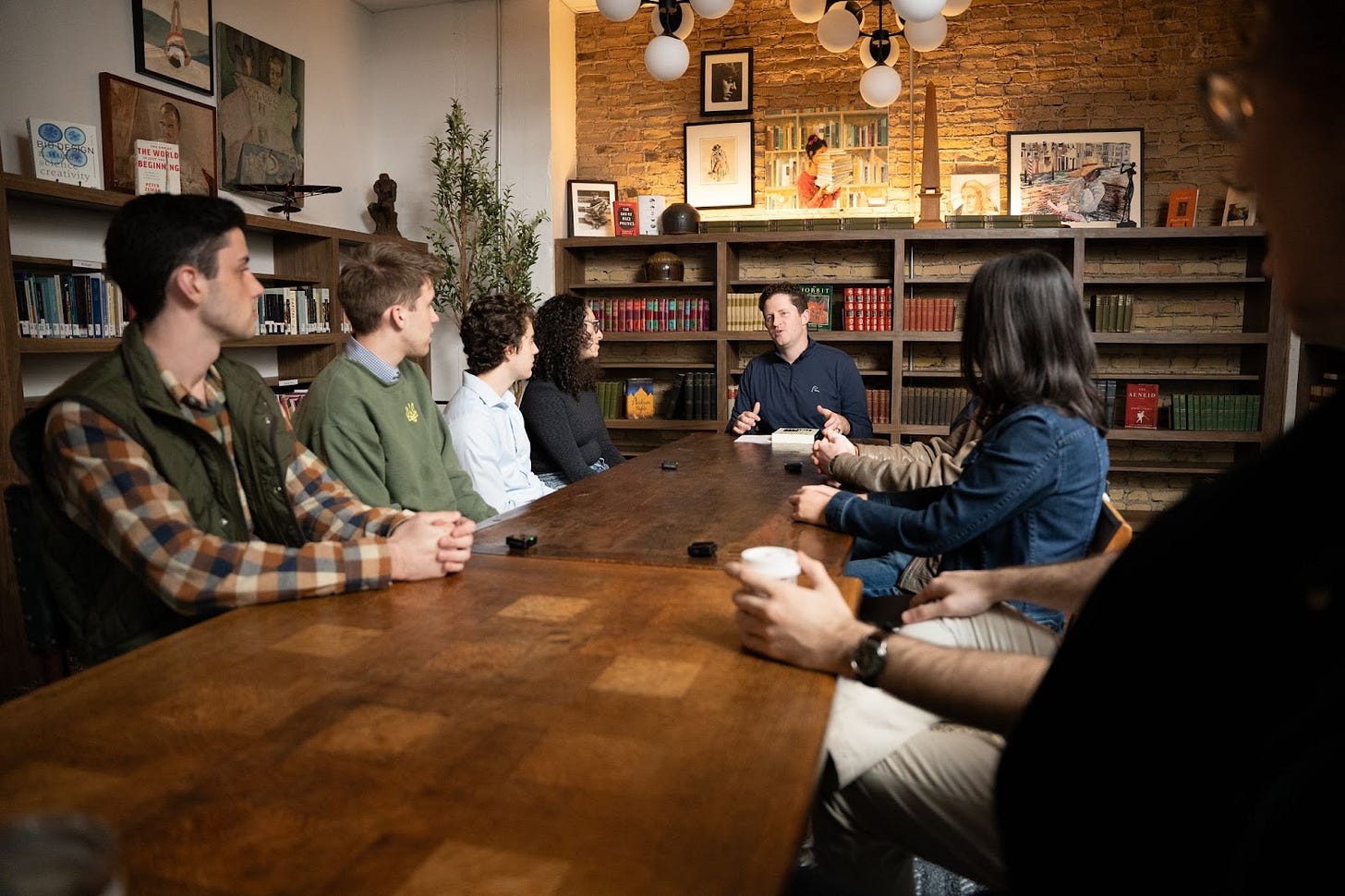In a new video and essay, Dean of the Center for Economics, Politics, and History Morgan Marietta examines the controversy surrounding birthright citizenship.
“A first read of the opening line of the Fourteenth Amendment of the U.S. Constitution may sound as if it endorses universal birthright citizenship, until we read the limiting clause and consider what it means,” Marietta explains.
“Let no one tell you there is no debate or that the question is settled beyond discussion,” he writes. “There is a meaningful debate, in which Americans should engage. Citizenship means ownership of the Constitution, not avoidance of the duty to engage and understand.”
On the Constitution and What Makes a Citizen
By Morgan Marietta, UATX Dean of the Center for Economics, Politics, & History
The following is adapted from a longer essay by Dean Marietta. Read it here.
President Donald Trump’s recent executive order on birthright citizenship claims to be squarely within the meaning of the Constitution and federal law as they describe how the gift of citizenship is granted and limited. After all, the President cannot alter the law unilaterally, but can only exercise his power of implementing existing law, through the “executive power” (Article II, Section 1) and his obligation to “take Care that the Laws be faithfully executed” (Article II, Section 3). The core question is whether the United States' new policy fits within the Constitution's bounds. The executive order will be challenged, and the Supreme Court will likely make a ruling.
The major discussion of citizenship in the Constitution is found in the first sentence of the Fourteenth Amendment:
All persons born or naturalized in the United States, and subject to the jurisdiction thereof, are citizens of the United States and of the State wherein they reside.
At first glance, the language seems to establish the right of natural-born citizenship for anyone born in the USA.
However, it is not as simple as a quick reading of the Fourteenth Amendment. The first sentence of the Amendment also includes the limiting clause “and subject to the jurisdiction thereof.” This clause is easy to read past and ignore because it is not a common turn of phrase. Nonetheless, each part of the Constitution has meaning and cannot simply be redundant or superfluous, so we must address the meaning of this limitation.
If “subject to the jurisdiction” simply meant “in the geographical jurisdiction,” i.e., in the United States, then the clause would be redundant. It cannot simply be repeating the first part of the sentence (“all persons born in the United States and in the United States”). All persons born in the United States were also obviously at that time inside the United States. The meaning of the phrase must be something more than merely present within the borders.
“Subject to the jurisdiction” of the United States, in the context of citizenship, seems to mean at least “not subject to a foreign power” (i.e., not the national of another country). The Civil Rights Act of 1866 (passed by the same Congress that wrote the Fourteenth Amendment) employs that language: “All persons born in the United States, and not subject to any foreign power, excluding Indians not taxed, are hereby declared to be citizens of the United States.”
In this sense, “under the jurisdiction” means under the sovereignty—the legitimate recognized protection and authority—of the United States rather than another nation. To be “under the jurisdiction” does not mean merely present on the soil and subject to involuntary enforcement of some laws if caught violating them, but instead means recognized by both parties as living in a voluntary relationship with the national community.
The phrase describes an established reciprocal relationship between the person and the government: the nation has agreed that a person is under its protection, and the person has agreed to owe allegiance to the nation and live under its sovereignty.
The U.S. government has clearly not accepted unauthorized immigrants as being under its sovereignty. To say that a person becomes “subject to the jurisdiction” of a nation against its laws and wishes—by the force of will of that person and against the will of the nation—seems odd. From the other side of the relationship, if a person is intentionally hiding from the awareness of the national government, it is hard to argue that the person has voluntarily acceded to its sovereignty. In these senses there is a strong argument that unauthorized immigrants are not subject to the jurisdiction of the United States as described by the Fourteenth Amendment.
Like many constitutional questions, what we conclude about the constitutional status of birthright citizenship depends in large measure on whether we are persuaded by a living or an original reading of the Constitution. A living reading might conclude that the American people have evolved in our beliefs and values, broadening the meaning of the Fourteenth Amendment to endorse universal birthright citizenship. This would place a decision about the boundaries of citizenship beyond popular rule and into the realm of rights: those born on U.S. soil have a right to citizenship regardless of the current views of a majority of Americans.
On the other hand, an original reading is more likely to understand citizenship as being within the realm of popular sovereignty and majority rule through our representative system. In this view, natural-born citizenship is guaranteed by the Fourteenth Amendment to those born in the United States and also under the jurisdiction—the recognized governance and protection—of the U.S. government, but not those here illegally or visiting temporarily. In those cases, the American people can decide to grant or withhold citizenship or to change policies over time.
AI Entrepreneur Teaches Hayek
UATX launched a new speaker series, Builders & Books, where the most innovative entrepreneurs discuss their favorite books with students.
In the first of this series, AI entrepreneur and Cosmos Institute founder Brendan McCord led a roundtable discussion on Friedrich A. Hayek's Constitution of Liberty.
After launching two successful AI companies and the first applied AI organization for the U.S. Department of Defense, McCord embraced philosophy as a means of better understanding our world. He says Hayek's book offers a “forward look on what it takes to maintain a free society and how we drive broad prosperity.” Watch his lecture here.
A Market Solution for Course Selection
By Tim Kane, Professor of Economics at UATX
At most colleges, registering for classes involves waking up at the crack of dawn to get in line—online—hoping you’re early enough to secure key classes before they fill up. Woe be the undergraduate who forgets registration day, and good luck getting the courses you need.
Last autumn, the Deans at the University of Austin decided to implement a new course registration system that empowers students to bid on classes. Why? UATX is blessed with a few famous professors, and we realized that the fairest way to allocate the limited seats in 16-student seminars is to use market forces. The scarcity dilemma was real as we faced the second trimester—particularly with the registration for new elective classes by distinguished visiting professors. But what could students bid with?
We developed an artificial currency called Austin Reserve coins, or ARES for short, granting each freshman 500 coins per term. Students used the new ARES system in October to bid on Winter term courses, five weeks after opening the campus doors for the first time.
When the registration period for the upcoming Spring term rolled around last week, we were ready. ARES bidding is blind and singular, meaning students cannot see other bids and can only submit their bidding once. No do-overs. For example, Joe might bid 300 coins for Philosophy with Professor Alex Priou, 150 for Economics with Professor Tim Kane, and 50 points for Calculus with Professor Eliah Overbey. The classes that they "win" cost the coins bid, and the unspent coins are returned for use in future terms. So last week, when the ARES market opened, most UATX students had unspent coins from the previous term, plus 500 new coins allotted for this term.
The innovative course bidding allocation has a surprising benefit on the supply side. When a professor walks into the classroom at UATX, they see something unseen at any other university: sixteen individuals seated around the seminar table who want to be in that room with that professor more than all the other students on campus.
Even though we were ready for the new ARES market last week, something extraordinary happened when the bids were tabulated. An elective course on the Philosophy of History set a stunning record. Only one section of the course will be offered this Spring trimester, which will be co-taught by Niall Ferguson and Brandon Deadman. Students have been buzzing about the class for months.
Once the market closed, I reviewed all the submissions and was shocked to see that over two-thirds of UATX students had bid for this singular course. Nearly 22,000 ARES coins were bid on this one class, with an average bid of nearly 400. By comparison, the next most popular course had one-eighth that many coins in total. Amazingly, students who bid 500 coins for Deadman and Ferguson's course failed to get the class. The minimum winning bid was 549, while the top bid was 840.
Christian Niczyporuk, a freshman who missed out on the course, said, "The ARES system really is like the Barett Jackson auction of the academic world. The only constraints are your given credits and true desire."
First-year Theo Murokh added, “I think that I missed out because I underestimated the demand, rather than ARES being a rigged system that works against me. It would be cool to experiment with a live auctioning system next term, but I think it might be very stressful refreshing the page every 5 seconds.”
Thanks to the full support of the Deans and Registrar, and especially to the coding skills of Dean David Ruth, the ARES market cleared efficiently and to the great satisfaction of the student body. Given the option of using a "first come, first serve" standard registration found at other colleges, 94% of UATX freshmen prefer to keep ARES for all their elective options.
It turns out Adam Smith and thousands of other economists were right: markets are the fairest way to allocate scarce resources. Fairness is rather popular, too.
Maggie Kelly is Communications Manager at the University of Austin.














Share this post